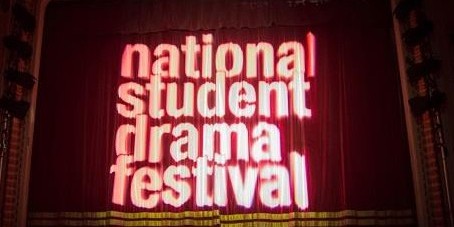The power of storytelling at the National Student Drama Festival
The National Student Drama Festival (NSDF), which took place at De Montfort University in Leicester from 24-30 March, showcased selected productions from students aged 16-25 across the country. Warwick University was represented by Freshblood New Writing’s Seeking Intimacy and WUDS’ Speed Death of the Radiant Child.
It was a privilege to have gone to NSDF with the incredibly talented people involved in Seeking Intimacy. With graduation approaching in two months, a time when I need to focus on the inevitable practicalities associated with embracing adult life, NSDF allowed me to dream for seven days. From watching almost 10 plays in one week, to performing Seeking Intimacy seven times, to participating in workshops with theatre professionals (I want Yvonne Morley from the RSC to be my grandmother – her soul is the definition of a warm hug), I have never felt happier to be that exhausted. As someone who’s only been involved in theatre for a year, and that too in limited spurts, NSDF was a transformative experience.
It is so cool to be in a bubble where everyone is appreciative of each other’s creative visions. Each day, there was a panel discussion about the plays which had been performed. It was surreal to have a gigantic room filled with 200 people bouncing off comments and insights on each other’s production. Understanding how fellow students are trying to convey their creative vision is inspiring, and I had a massive overdose of that inspiration at NSDF.
As someone who’s only been involved in theatre for a year, and that too in limited spurts, NSDF was a transformative experience
I’m particularly passionate about how theatre and performance can elevate social commentary from the normally distanced news article to a place of intimacy and empathy. I had the privilege to perform in Seeking Intimacy’s commentary on our relationship with technology. In Sam Ross’ Can’t Stop Can’t Stop, meanwhile, I witnessed an incredibly brave one-man show concerning the struggles of living with OCD. As the performer himself is diagnosed with OCD, the line between performance and reality was blurred. It wouldn’t be an exaggeration to say that everyone was devastated by the end, audiences and performer alike. Heart-breaking, daring, divisive – whatever the differing opinions were, no one could deny that they were deeply affected by what they saw.
I think an intense power comes from storytelling on stage, especially when the physicality of the performer is manifest. Denise Gough, who played a character struggling with addiction in People, Places and Things at the National Theatre, said in an interview that her performance felt validated when a recovering addict from the audience shouted, “Good girl!” at the moment when Denise’s character decides to seek treatment. I am fascinated by that relationship between the performer and audience, and it was so rewarding to feel something akin to that when watching productions at NSDF.
Heart-breaking, daring, divisive – whatever the differing opinions were, no one could deny that they were deeply affected by what they saw
I was also in an environment where theatre professionals and students held intimate conversations about how lack of representation stops people from expressing themselves creatively. ‘Diversity’ has a formal connotation, a box to be checked on a form rather than an active issue that affects every part of society, and it was refreshing to be able to push past that barrier. Naomi Obeng wrote an excellent article detailing her thoughts, and Ava Davies said this particular line in the festival’s official magazine that really resonated with me:
“I have to keep saying why I need to see myself onstage, and it’s not even to white people anymore, it’s other East and South East Asians who don’t seem to get it and I don’t know why.”
When I came back from the festival, I happened to be watching an Andrew Garfield interview about his ‘artistic self-realisation’. One day he felt immense stage fright before a play, went on a walk in London’s South Bank and saw a busker:
“He wasn’t even a very good singer or guitar player, but he had woken up that morning, he had gotten out of bed, he picked up his instrument, he walked on his stage on the concrete, he breathed in, and he let himself express himself in the way he felt called to, and he showed up with his fallibility, and all of his s*** right there.”
Theatre professionals and students held intimate conversations about how lack of representation stops people from expressing themselves creatively
And Andrew went back to perform on stage. And that to me is the essence of NSDF. What has always held me back from fully giving myself to theatre and drama is the fear of being judged for failing, which I think everyone who has auditioned or has expressed themselves creatively in any form can empathise with. But Andrew’s interview made me realise that the drive to get out there and share your story, whether it is imperfectly raw or immensely pristine. The very fact that you have the courage to share such an intimate part of you is good enough, and that in itself should be celebrated. To expose your creative talents, whether on-stage or backstage, is to be in a position of intense vulnerability, and to be constantly surrounded by people who celebrate, cherish and understand why we strive to take those positions was breath-taking.
For me, ever since the last two years of high school, everything has been practically oriented around being successful in the next step of life. I had to get good results to get into a good university, get a good degree to be employable, and so it continues. Letting my imagination run wild through theatre has allowed me to break out of that mindset. At NSDF, I felt justified in believing that my stories and thoughts matter, and that they should be expressed.

Comments